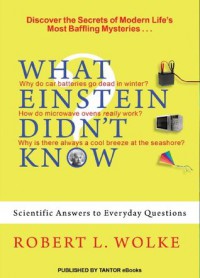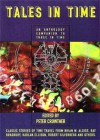Currently reading
What Einstein Didn't Know

Scientific Answers to Everyday Questions
by Robert L. Wolke
What Einstein Didn't Know is not just a book filled with trivial facts about science and nature, but explanations for why things happen as they do. The fun starts right away in the table of contents where you can see the interesting selection of pieces of information that comprise this most fascinating book.
Examples include; chemicals that make water hot or cold and why, how dry ice works, what the term 'proof' means on an alcohol bottle and where the term came from, what is used to fortify cereals with iron in a non-toxic form, what makes the foam on your Starbucks coffee, the difference between incandescent and fluorescent lights as well as LEDs, how to read bulb packages and a nifty conversion for those who remember incandescent bulbs in watts (for example, an old 40 watt bulb is 500 lumens) and how to tell if a crab is male or female. And that's just the first chapter!
Further chapters cover information about how things work in the kitchen or around the house, the infernal combustion engine, the great outdoors, water, and the basic laws of nature. Do you know how infrared radiation works to allow thermo-imaging devices to make it possible for us to see in the dark? I do now, because I've read this book. Everything from ocean breezes to the reason for optimum hours to get sunburn is explained in easy and often amusing terms. There is even a section in the back to explain buzzwords, those scientific terms that build your vocabulary and comprise part of the language of science.
This is a book to read in segments, at least for me. Too much information at once can get lost in the assimilation, but the pieces of information are fascinating and would make great fodder for pub quizzes. This is one I am likely to go back to for references many times and to read through again to remind myself of all the fascinating facts that I might have forgotten after the first reading.
Highly recommended!
 2
2





